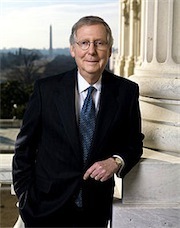Matthew Yglesias's Blog, page 2499
November 15, 2010
Medicare After Obama
Playing around with the NYT's deficit calculator I came up with a plan that involves raising the eligibility age for Medicare.
I'm a bleeding heart, at heart, and don't like the idea of any kind of cut on social welfare expenditures. But within the realm of reductions in social outlay, I think it's surprising and upsetting that we don't hear more about this option. Instead, everyone seems to want to raise the eligibility age for Social Security. This makes little sense to me for two reasons. One is that seniors can buy healthcare with money if they want to but can't sell Medicare benefits in exchange for food or whatever. I'm not of the school of thought that believes cash benefits are always superior to in-kind benefits. But the merits of in-kind benefits, if any, are normally paternalistic in nature. And there's really no reason to be paternalistic about senior citizens. Whatever total quantity of money we decide to dedicate to retirees, the retirees themselves should decide whether that money is used to buy hip replacements or presents for grandkids or whatever.
I suspect that part of the issue is that the implications of the Affordable Care Act haven't really sunk in yet. Traditionally raising the Medicare eligibility age more than a teensy bit would be unthinkable, since absent Medicare an elderly person would be totally uninsurable. But under ACA that's not the case. Of course subsidies will be needed for most retirees, but a workable highly progressive system would be in place to ensure that nobody has to go without access to health coverage.


Planning for the Worst
I agree with Steve Benen that it would only make sense for the White House to make sure to be "planning for the worst" when it comes to dealing with Republicans on the Hill. But the specific thing I would worry about isn't gutting of health care legislation or endless investigations. It's the economy. Anne Kornblut reports that the White House understands the basic political dynamic: "Even more important, senior administration officials said, Obama will need to oversee tangible improvements in the economy."
So I know that tangible improvements in the economy are key to Obama's re-election chances. And Douglas Hibbs knows that it's key. And senior administration officials know that its key. So is it so unreasonable to think that Mitch McConnell and John Boehner may also know that it's key? That rank and file Republicans know that it's key? McConnell has clarified that his key goal in the Senate is to cause Barack Obama to lose in 2012 which if McConnell understands the situation correctly means doing everything in his power to reduce economic growth. Boehner has distanced himself from this theory, but many members of his caucus may agree with McConnell.
Which is just to say that specifically the White House needs to be prepared not just for rough political tactics from the opposition (what else is new?) but for a true worst case scenario of deliberate economic sabotage.


November 14, 2010
Uncertainty and Aggregate Demand
I agree with much of what Kevin Drum has to say about the notion that the economy is being held back by a mysterious increase in "uncertainty."
But a deeper lancing of this particular boil starts with the observation that it's totally unclear what's supposed to make this different from the standard Keynesian diagnosis. Indeed, Keynes himself put uncertainty front and center in his diagnosis of the business cycle and more modern "Keynesian" accounts tend to leave it out because it's (a) hard to model and (b) not clear what difference it makes (see Brian Weatherson, "Keynes, Uncertainty, and Interest Rates" [PDF]).
Policymakers can't make it cease to be the case that the future is uncertain. Policymakers can observe, however, that if economic actors' level of uncertainty about the future increases that would manifest itself as an increased demand for money. Increased demand for money is a funny beast. Normally if demand for one kind of good or service falls, demand for other goods or services has to rise. But if what people demand is money itself then we find ourselves mired in a general glut, a shortfall of aggregate demand. Which is to say you'd be in just the normal Keynesian situation and you'd want to get out of it in just the normal Keynesian way—looser monetary and fiscal policy to bolster aggregate demand, soak up the excess capacity, and return us to a low-idleness equilibrium.
So if for whatever reason businessmen or politicians or media figures or anyone else feels more comfortable expressing the situation as one caused by "uncertainty" that's fine. But the name of the game is still fiscal and monetary expansion. But instead the proposed cure typically seems to be "shift public policy in a more rightwing direction." That wouldn't do anything about uncertainty or a shortfall in aggregate demand. It's just a faux-sophisticated way of saying "I'm a rich businessman who wants politicians to cater to my interests more."


Controlling Health Care Costs
Tim Pawlenty's got a Union Leader op-ed that I guess is supposed to illustrate his resumé as a Presidential contender. But amidst all the fulminations, we get to the point that anytime people decide to stop playing stupid political stunts and start talking about real issues, the differences in our politics narrow considerably:
For example, when it came to state employees and their health care, we gave individuals more freedom and responsibility to decide how to spend their own money. What does that mean? To reverse the trend of soaring health care costs in Minnesota, we gave our state employees financial incentives to select high-quality, low-cost health care. With some of their own skin in the game, the vast majority of employees chose more efficient providers. As a result, over the last five years we've seen low, and in some years no, premium increases.
Contrast that with President Obama's approach to health care reform. It drags health care into Washington, D.C., expanding bureaucracy, mandates, entitlements and government subsidies. It does nothing to control costs. And once again, the government will serve up the allure of endless consumption and a magically disappearing bill. But we know nothing is truly free.
Now in fact that Affordable Care Act does a lot of different things. One thing it does, however, is impose a tax on unusually expensive health care plans. It also indexes the threshold for what counts as a very expensive plan to the overall rate of inflation, meaning that over time a larger and larger share of plans will be subject to the tax. What's the impact of that? Well it creates financial incentives, over time, for employees to select lower cost health plans that put more of their own skin in the game. That's Barack Obama's main idea about how you can lower the rate of growth of health care costs, and it's also Tim Pawlenty's idea.
That's not to say no important disagreements exist in politics. When Obama put this idea forward, he got significant pushback from labor unions and the ACA wound up including a version of the tax that's much scaled back from the initial proposal. And Pawlenty's version of this idea thrusts the entire burden of adjustment onto employees of the Minnesota state government, letting the general class of "people who have very fancy health plans because they're rich" escape unscathed. Insurance companies and health care providers call health care costs "income" and they don't want to see it reduced and they argue, not entirely unreasonably, that high health care profits drive innovation.
So there's plenty to disagree about here. And the sooner the country starts having a real discussion about those real points of interest instead of the fake discussion about a made-up version of the Obama administration's proposals, the better off we'll be.


Politics as Investment
The view that American politics merely represents politicians bowing to the will of big money is unpopular among political scientists, to a degree that I find somewhat surprising. Thomas Ferguson, however, is an exception to this trend and he leans all the way in the other direction:
People who were hailing Obama as a new FDR were viewing American politics through the wrong lens. They were treating public policy as the result of the will of voters. But in fact, American political parties are mostly bank accounts. What you are told is the voice of the people is usually the sound of money talking.
Much of my research has been devoted to showing how both parties are dominated by blocs of large investors. The policy choices political parties present to the public on Social Security, macroeconomic policy, campaign finance reform, and indeed nearly every other policy area save a handful of hot-button "social issues" are basically dominated by big money. The consequences are disastrous: Neither party can level with the American people in crises. They cannot diagnose problems like the financial crisis with any honesty and they can't make any detailed case for why the policies they do sponsor would actually benefit ordinary Americans. What we get instead are pseudo-explanations, myths, and sometimes, obvious mendacity. Political discussions in the media, where they are not distorted by the plain interests of the concerns themselves, are dominated by denizens of the "think tank" and "policy institute" world. Most of these institutions are heavily driven by, surprise, surprise, big money in the form of donors.
I think these conclusions are more plausibly reached through something more like Marx's account of ideology or Lindblom's "Privileged Position of Business in Polyarchy." Political and media elites crave the esteem of business elites over and above their desire for their money.


What's the EPA Doing, Carbon-Wise?
In the absence of a climate change bill, the Environmental Protection Agency is moving ahead with its Clean Air Act mandate to begin regulating carbon dioxide emissions. But what, exactly, is happening. Dave Roberts checks in with a detailed post. Lots of action, but as he says "Climate hawks shouldn't expect much from these upcoming regulations. They won't be a substitute for the climate bill. Not even close."
The fundamental problem is that unless we're planning on not using any electricity in the future, we need to actually replace dirty power plants with clean ones and the EPA can't conjure up solar panels. You need congress.


Cantor, Israel, and the Midterms
There's certainly something odd about House GOP leader Eric Cantor telling a foreign Prime Minister that he intends to side with the foreign government against US government policy. But of course all that's really going on here is that Cantor is speaking a bit too candidly about something everyone knows to be true—the government of Israel's policy preferences carry a lot of weight in the US Congress.
I think the more interesting issue is that objectively speaking Cantor's claim that the GOP takeover of congress decreases Barack Obama's leverage over Bibi Netanyahu is mistaken. After all, it was already the case before the election that Netanyahu had a working legislative majority in the House on key issues. The real change is the decline in importance of guys like Henry Waxman, Howard Berman, Anthony Weiner, Debbie Wasserman-Schultz, Alan Grayson, and other strongly AIPAC-friendly members of congress who are reliably liberal on domestic issues. It used to be that Barack Obama had an ambitious legislative agenda that relied on the active support of this group of people. That gave them some leverage even over the aspects of American foreign policy that the congress doesn't have any formal responsibility for.
Now things have changed. It's true that Eric Cantor will do what he can to obstruct Obama's policy toward Israel, but Eric Cantor can also be relied upon to disagree with Obama quite systematically about almost everything. The result is that while Obama's set of politically feasible options vis-à-vis Israel is still constrained, it's in practice less constrained than it was before the election precisely because the other constraints on him are now tighter.


La Plus Ça Change
Hendrick Hertzberg pulls out an anti-Lincoln cartoon from the 1862 midterms at which the Republicans got a bit of a shellacking. I've just pulled a small sample of the image and posted it at right.
I think the evident similarities between aspects of political rhetoric today and 150 years ago highlights the extent to which the values-and-temperament debate between conservative nationalism and progressive cosmopolitanism is ultimately much more fundamental than the passing controversies over tax rates economic regulation. The basic anxieties provoked by threats to existing status hierarchies haven't changed, nor have the rhetorical tools of countermobilization.


November 13, 2010
Backwards Causation
If I'm understanding this Lee Ohanian paper (PDF) correctly, he wants us to believe that the Great Recession was caused not by the collapse in aggregate demand that occurred in 2008 and its failure to get back up to trend in 2009-2010 but instead by time travel. In particular, the Troubled Asset Relief Program of the Bush administration and various Obama-era interventions traveled back in time to cause a recession. I'd heard secondhand that Ohanian adheres to a time travel theory of the Great Depression, but thought that might be a caricature. But he really does say on Page 61 of this document that TARP initiated a recession ("perhaps because policymaker communications concerning the underlying strength of the economy increased uncertainty") which was then exacerbated when the Treasury announced a small means-tested mortgage modification program that inspired people to become unemployed in order to qualify for loan forgiveness.
It's all down there on paper!
Economics aside, I'll just make the sociological observation that it's strange to bolster an argument in favor of free markets and against government intervention via a theory which holds that the operation of the market is in fact so delicate that downbeat utterances from George W Bush can lead to a worldwide loss of trillions of dollars in output.


Climate Feedback Loops
Via Ryan Avent's Twitter feed and Paul Kedrosky, a nice look at what's dooming the planet:
Forests in the Interior West could soon flip from carbon sink to carbon source, forest experts say. The region's forests once absorbed and stored more carbon from the atmosphere than they released. But huge conflagrations — like the 138,000-acre Hayman Fire in Colorado in 2002 and the Yellowstone fires of 1988, which scorched 1.2 million acres — combined with a series of severe bark beetle infestations and disease outbreaks, have left large swaths of dead, decomposing trees in almost every major Western forest.
Those dead trees are releasing massive amounts of carbon dioxide, turning the region into a net emitter of carbon rather than a CO2 sponge.
The reversal, which has already occurred in Colorado and is anticipated in several other states, is the result of misguided forest management practices and a changing climate, forest experts say. Rising temperatures, resulting in shrinking snowpacks and drier conditions, have left the region's forests more susceptible to disturbances, such as wildfires, bark beetles and disease.
A modest rise in world temperatures, if it stays modest, could be manageable. But a modest rise in world temperatures could lead to a big increase in greenhouse gas levels through a variety of feedback loops. Then the rise gets unmanageable, especially since once all this stuff gets into the atmosphere the climate just keeps getting hotter.


Matthew Yglesias's Blog
- Matthew Yglesias's profile
- 72 followers






